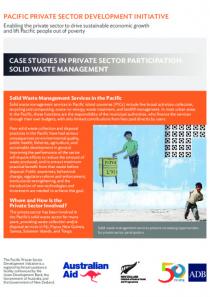Solid waste management services in Pacific island countries (PICs) include five broad activities: collection, recycling and composting, waste-to-energy, waste treatment, and landfill management. In most urban areas in the Pacific, these functions are the responsibility of the municipal authorities, who finance the services through their own budgets, with only limited contributions from fees paid directly by users. Poor solid waste collection and disposal practices in the Pacific have had serious consequences on environmental quality, public health, fisheries, agriculture, and sustainable development in general.
Improving the performance of the sector will require efforts to reduce the amount of waste produced, and to extract maximum practical benefit from that waste before disposal. Public awareness, behavioural change, regulatory reform and enforcement, institutional strengthening, and the introduction of new technologies and investment are needed to achieve this goal.
Published by the Private Sector Development Initiative (PSDI) with input from PRIF and its Urban Development Sector Working Group.

